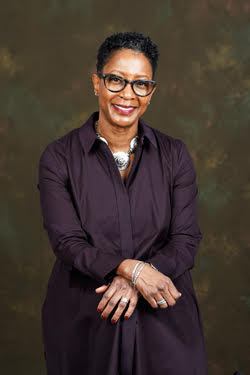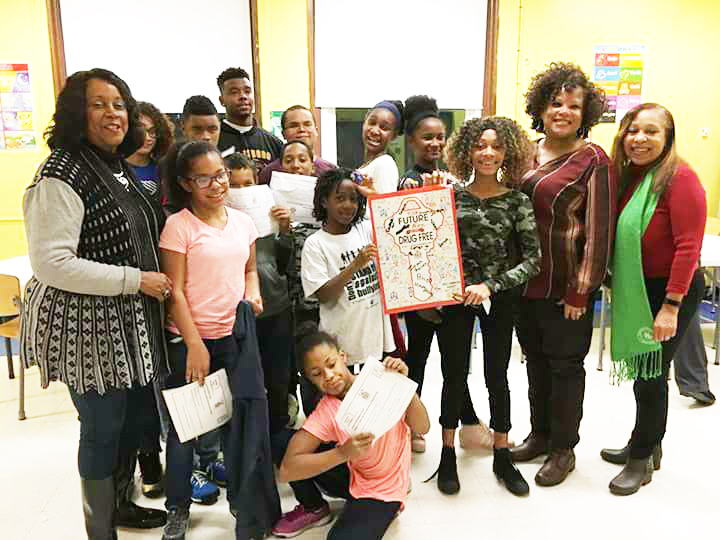Continental Societies, South Jersey Chapter, has established a strong Trust Based Philanthropy relationship with the Boys & Girls Club of Gloucester County. (Pictured above)
Last Fall’s “Why We Give” event, sponsored by Community Foundation of South Jersey and Weber Gallagher, spotlighted the importance of community as a draw for giving back, especially for women. Giving communities are not always based on geography. They’re often formed around commonalities of gender, culture, religion, life experience, or world views. Giving is personal, and the community you belong meets a deep human desire to join with like-minded people around a common cause. It’s where your giving is valued and appreciated and you feel like an important part of the results that are achieved.
Nowhere is the draw of the community more evident than among African American service-oriented groups like sororities and fraternities. We have witnessed how the “Devine Nine,” the nine Black Greek-lettered organizations, can influence a national election. They are a quiet yet powerful force that seems to be lost on the mainstream. And their loyalty is fierce. Members pledge a lifelong commitment to social engagement, giving and volunteering. Their giving power may not be in the headlines every day, but their numbers, economic mass and knowledge of needs are impactful and comprehensive. As summarized in this Washington Post article, a study from the W.K. Kellogg Foundation and Rockefeller Philanthropy Advisors shows that nearly two-thirds of Black families make charitable donations, worth a total of about $11 billion a year.
Black Greek-lettered organizations and other African American social groups that come together for the sake of giving back have a long and influential history. Members of the Devine Nine and groups like Continental Societies Inc., The Links, Jack and Jill, and other similar organizations are college-educated, upper and middle class, and play as big a role in Black communities as Black churches. According to Generocity.org, these groups act as a major vehicle for charitable giving for African Americans. “The nine major Black fraternities and sororities… were all founded on principles designed to advance communities. Those principles include brotherhood and sisterhood, scholarship, and servant leadership. Giving among Divine Nine members and chapters is rooted in a collective commitment to Black causes.”
Black Greek organizations and other giving groups have strong ties to their communities, and they tend to pair financial support with boots on the group volunteerism. For example, Continental Societies, Inc. South Jersey Chapter has a relationship with the Boys & Girls Club of Gloucester County that includes money, but also maintaining a presence within the clubs. This eyes-on approach is a form of trust-based philanthropy that allows them to react to issues in real-time and with little red tape.
“During COVID, the kids who were using the clubs for remote learning had access to computers and the internet, but they had no way to be seen by or respond to the teacher,” said Janice Wardle, Continental Society Inc., South Jersey President. “Because we were there regularly, we saw the situation and quickly purchased cameras and microphones so the students could fully participate in remote learning at a critical time.”
There was no grant application, no 990 review, no reporting required. The Continentals responded instantly to a need they saw because of the trust built through a hands-on relationship with an organization they knew well.
At a time when so many are seeking ways to affect diversity, equity, and inclusion, the Devine Nine and other organizations show the importance of building relationships with nonprofits and removing some of the bureaucratic obstacles between them and big donations.
There’s also an important lesson about being part of a community you’re trying to help. Too often foundations, government funders and big donors are not present in communities they give to, and therefore are likely to miss opportunities to react to real and immediate needs. Combine that with the fact that smaller, minority-run nonprofits don’t have the capacity to spend hours on proposals and reporting. The end result: they miss out on large grants that would allow them to scale up. Yet the work they do is directly connected to their unparalleled knowledge of community issues.
If you’re interested in ways to connect and respond to lived experience and community needs, consult a member of the Devine Nine or another African American giving group. You won’t have to look far. They are your co-workers, peers, and neighbors of color. They are the parents of your kid’s friends and teammates. If you’re serious about advancing inclusivity in giving, all you have to do is look to your left or right for someone to invite for coffee or a cocktail. You will learn about a long-standing community of generous and engaged givers who are hidden in plain sight.


